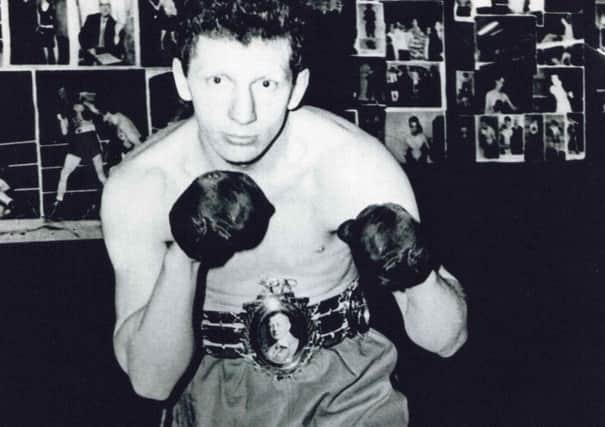Obituary: Jackie Brown, Scottish boxer who won prestigious titles in middle years of the last century


Jackie Brown, who has died in Australia aged 84, was a top Scottish boxer of the 1950s and 1960s who won Scottish, British and Commonwealth fly weight titles at both amateur and professional level, later in his career adding the Scottish professional bantam weight crown to his laurels. Inducted into the Scottish Boxing Hall of Fame in 2006 he enjoyed a long successful career which began as an amateur in the early 1950s and finished with his final bout as a professional in 1966. In the ring he mixed with several top drawer names, including future world flyweight champion and fellow Scot Walter McGowan, whom he beat in their first bout, former world bantam weight champion Mario D’Agata, whom he also defeated, and Johnny Caldwell, former world bantam weight champion with whom he drew. He fought throughout Britain and Ireland and various countries abroad including France, Finland and Italy. Another highlight was sharing a dressing room with Muhammad Ali while on the undercard of his bout against Brian London at Earls Court in 1966.
A keen cyclist as a teenager, a chance visit to Gilmerton Boxing Club in his early teens sparked his interest in the sport. Later he joined Leith Victoria Boxing Club in whose colours he won the Scottish amateur flyweight title, which qualified him for the ABA Championships in 1958 at the Empire Pool, Wembley. Despite having to fight a semi-final the same evening, he defeated Welsh opponent Gerald John to claim the title.
Advertisement
Hide AdAdvertisement
Hide AdThree months later in July at the British Empire and Commonwealth Games in Cardiff at the city’s Sophia Garden venue, he won the flyweight title on points against English finalist T Bache, becoming the third consecutive Scot to claim the title, after Hugh Riley and Dick Currie in 1950 and 1954 respectively. A street party was held in Edinburgh’s Lyne Street in his honour on his return home with the gold medal.
In October that year he made his professional debut at Paisley Ice Rink against Mark Quinn, whom he defeated by TKO. Almost a year later he won his first professional honour, the Scottish flyweight championship, beating Alex Ambrose, also by TKO, and by August 1960 he had won all fifteen of his bouts including the notable scalps of D’Agata and leading rival Johnny Morrissey.
Defeat in 1961 to the heavier Freddie Gilroy, future European bantam weight champion, did not derail Brown, with him going on later that year to successfully defend his Scottish flyweight title against McGowan.
On 27 February 1962 in Birmingham he defeated Brian Cartwright on points to clinch the British flyweight championship and in December successfully defended it against Nigerian Orizu Obilaso, adding the Commonwealth crown at the same time, despite being down for a count of nine in the second of 15 rounds.
But six months later he lost both titles to McGowan who, according to one report, “oozed class”, before knocking him out in the 12th round which led to Brown moving up a weight to fight at bantam.
Within a year he won the Scottish bantam weight crown defeating Tommy Burgoyne at the National Sporting Club in Piccadilly. On 11 November 1964 at Paisley Ice Rink in a non-title bout he fought Johnny Caldwell, then British and Commonwealth bantam champion and former world title holder. In what many thought was the best performance of his career he secured a draw and was extremely unlucky not to be awarded a win, one report suggesting Brown was ahead by a “huge margin of points”, and that to win the bout “Caldwell would need to knock Brown out in the last round”.
After another 11 bouts, which included one against future European bantam champion Bob Allotey and another with fellow Scot Evan Armstrong who took his Scottish bantam title, Brown hung up his gloves at the end of 1966, after 44 bouts – 32 wins, 2 draws and 10 losses.
Initially brought up at Grange Court in Edinburgh’s southside, Brown moved to the Moredun area as a teenager where he met Margaret, whom he married in 1958 shortly before the Empire Games. They set up home in the city’s Abbeyhill district and went on to enjoy a long happy marriage during which they had three children, Jacqueline, Shirley and Johnson. Shirley was a Scottish squash international while Johnson won the Scottish junior tennis title.
Advertisement
Hide AdAdvertisement
Hide AdAlthough he boxed professionally, his purses were such that he still had to earn a livelihood, which he did as a domestic appliances engineer. After retiring from boxing he became involved in fitness training and helped train leading junior football side Arniston Rangers in the late 1960s for several years. He also became well known for his “boxing exercise” classes at the capital’s Marco’s Leisure Centre which were very popular and ran for over 20 years.
After their children emigrated to Australia he and his wife also did so about ten years ago and settled in Sydney.
Unfortunately within a year he was diagnosed with dementia and he spent his latter years in a care home where, despite his condition, he still enjoyed doing some fitness work with fellow residents. He is survived by his wife, children and grandchildren, Sophie, Phoebe and Geordie.
JACK DAVIDSON